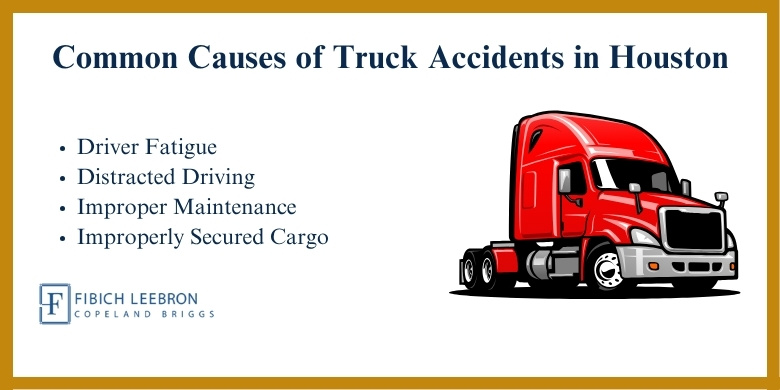Truck Driver Safety Tips Useful in Houston

Truck driving is a demanding job that requires constant awareness of your surroundings and strict adherence to safety regulations. In populated areas like Houston, Texas, truck driver safety tips are even more vital than usual. Heavy traffic and variable road conditions due to construction can lead to catastrophic consequences if a truck accident occurs.
If you were involved in a truck accident as a driver or passenger, contact Fibich, Leebron, Copeland & Briggs for a free consultation with one of our experienced Houston truck accident lawyers. During your initial consultation with our team, we’ll review the factors that contributed to the accident, explain your options for seeking financial recovery, and answer your questions about the legal process and your case.
Why Truck Driver Safety Matters in Houston, TX
As a major city, Houston’s road network includes both high-speed highways and different city streets, presenting challenges and risks for truck drivers. This leads to a higher potential for accidents, which can have devastating consequences for all parties involved. Truck drivers can protect themselves and others from sustaining severe or fatal injuries, as well as reduce disruptions to the city’s supply chain, by prioritizing safety.
Houston Truck Accident Data and Common Risks
According to data from the Texas Department of Transportation (TxDOT), in a recent year, Houston saw over 66,000 motor vehicle crashes, resulting in 339 fatalities and 1,519 suspected serious injuries. The same year, Harris County saw 6,313 commercial vehicle crashes, including those involving commercial motor vehicles. These commercial vehicle crashes resulted in 41 fatalities and 112 suspected serious injuries.

Some of the most common causes of truck accidents in Houston include:
- Driver Fatigue – Long hours of driving without adequate breaks can lead to impaired judgment and slowed reaction times. This is why the Federal Motor Carrier Safety Administration (FMCSA) requires drivers to take regular breaks and limit their time behind the wheel.
- Distracted Driving – According to the National Highway Traffic Safety Administration (NHTSA), using cell phones, eating, and other distractions are among the leading causes of fatal accidents nationwide.
- Improper Maintenance – Trucks that don’t receive proper maintenance are more likely to experience part failures and breakdowns. For example, brakes that haven’t been replaced may fail, causing a severe rear-end accident.
- Improperly Secured Cargo – When cargo isn’t secured according to FMCSA guidelines, it can fall from the back of flatbed trailers or shift during transit, making rollover and jackknife accidents more likely.
Pre-Trip Inspection Tips
Before heading out on a delivery, truck drivers should inspect various aspects of their vehicle and cargo to ensure they are in good working condition. These inspections should include:
- Checking the tires and brakes to make sure they are in good condition to prevent blowouts and brake failures
- Inspecting lights and turn signals to confirm they are functioning properly and visible to other drivers
- Examining the cargo to verify it’s properly secured and won’t shift during transit
- Reviewing your vehicle’s fluid levels, including oil, coolant, and other essential fluids
Regular inspections can identify potential issues with your truck before they cause crashes that injure you or those around you.
On-the-Road Driving Safety Tips
Truckers should maintain a safe following distance from the vehicles ahead when driving. Due to their weight, large trucks require more distance to come to a complete stop, so following too closely can result in rear-end collisions if the driver ahead brakes heavily. For this same reason, truck drivers should stick to the speed limit and reduce their speed in hazardous conditions, such as when in construction zones, when visibility is poor, and when the road surface is slick.
Before making wide turns on narrow city streets, be sure to be aware of your surroundings. Don’t forget to check your blind spots before swinging out wide.
Fatigue and Rest Management
A professional truck driver must get enough sleep before getting behind the wheel of their vehicle. The FMCSA requires that drivers spend at least 10 consecutive hours off duty after 11 hours of driving, and prohibits drivers from driving beyond the 14th hour after coming on duty following a break of 10 consecutive hours or more.
Additionally, drivers must take a 30-minute break for every eight cumulative hours behind the wheel. Drivers are also prohibited from driving more than 60 to 70 hours in seven to eight consecutive days without taking at least 34 consecutive hours off duty. These regulations are in place to prevent fatigue from causing severe 18-wheeler accidents.
Health and Wellness on the Road
It’s essential for drivers to stay in good health while driving long distances. This involves staying hydrated by drinking plenty of water, eating a balanced diet that limits fast food consumption, and exercising regularly to counteract the long hours spent sitting.
A healthy lifestyle can improve your focus and reduce the risk of making an error while driving. It can also reduce your risk of developing a chronic illness that impacts your ability to work or causes you to have a medical emergency while on the road.
Avoiding Distracted Driving
Distracted driving causes many truck drivers to miss hazards on the roadway ahead, including stopped or slowed traffic. Some of the most common distractions for truck drivers include:
- Using cell phones to talk, text, browse the internet, or watch videos while driving
- Adjusting their GPS while driving, rather than waiting until they are stopped
- Reaching for items elsewhere in the truck’s cab or attempting to prevent items from tipping over, rather than having them secured before driving
- Eating and drinking while driving instead of pulling over and taking a break
Staying focused on driving will reduce the chances of getting into a crash because your attention was elsewhere.
Load Safety and Cargo Securement
While cargo loaders are typically responsible for loading and securing goods, truck drivers should verify that the cargo has been loaded and secured properly. The driver is the one who will have to deal with the aftermath of unsafe cargo securement, which can lead to various types of accidents.
Some of the things you should check are that the appropriate restraints were used for the type of cargo being transported, that the restraints are in good condition and not showing signs of excessive wear, and that the truck hasn’t been overloaded. Overloading can impact vehicle control and braking, leading to accidents.
Learn more about truck accidents caused by improperly loaded cargo.
Emergency Preparedness and Safe Reactions
It’s important to know what to do if something goes wrong. This includes knowing what actions to take in the event of brake failure, a tire blowout, vehicle fire, or cargo falling from a flatbed trailer. It also includes knowing how to react to various hazards present on the road, such as construction, slow-moving vehicles, aggressive drivers, narrow streets, and more.
If your truck suffers a failure, it’s also essential to know who to call and what steps to take to get it repaired so you can get back on the road.
Local Tips: Navigating Houston Roads Safely
Be aware of high-traffic areas, including I-10, I-45, and I-610. Further out from Houston, US-59 can also become backed up with traffic. Heavy traffic can increase the risk of getting in a rear-end accident, especially if vehicles ahead of you hit the brakes hard or cut you off.
Truck drivers should also monitor weather conditions to avoid being caught out by storms and poor visibility. And since Houston is a major city, being aware of the various construction zones can speed up your deliveries and help you avoid some of the most common areas for truck accidents.
Why Trucking Companies Should Enforce Safety Training
Trucking companies must enforce safety training for all drivers they hire. Properly trained drivers are less likely to get into accidents, resulting in reduced repair and insurance expenses.
Truck accidents can be costly for trucking companies. Not only does it cost a lot to repair damaged trucks, but their insurance rates may increase due to the accident. Truck accident victims often sustain significant injuries, resulting in extensive medical bills, lost wages, and other expenses. While the trucking company’s insurance will usually cover compensation for accident victims, these insurers are in the business of making a profit and may pass some of the cost on to their customers through higher rates.
Contact Our Houston Truck Accident Lawyers for Help
Fibich, Leebron, Copeland & Briggs has served injury victims in Houston for decades, and founding partner Tommy Fibich has 50 years of legal experience. Over that time, we’ve garnered a positive reputation in the community and a track record of success, including winning several multimillion-dollar verdicts.
When you work with our team, you’re working with attorneys who are board-certified to handle the most complex cases. Tommy is certified in civil trial law, and attorney Russell Briggs is certified in personal injury trial law.
If you were injured in a Houston truck accident as a truck driver, passenger vehicle occupant, or pedestrian, Fibich, Leebron, Copeland & Briggs can help. Contact us today to arrange a free consultation with one of our skilled truck accident lawyers. We have years of experience handling truck accident claims, and we can help you understand your rights following a truck crash.